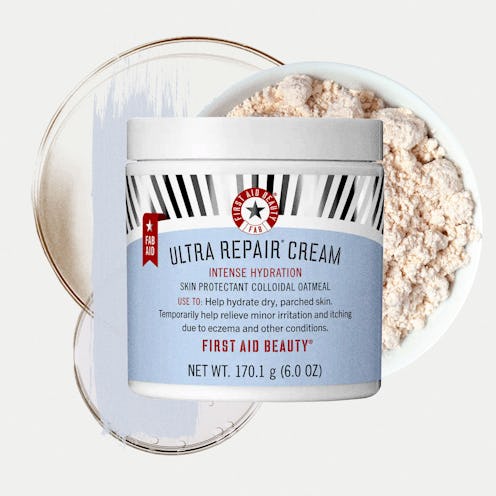(Back To Basics)
This Underrated Ingredient Is The Gold Standard For Soothing Itchy Skin
It’s beloved by derms & beauty editors alike.

With new products, brands, and categories popping up every day, beauty can be a bit overwhelming. Back to Basics is our rudimentary beauty series that serves as your crash course on the science behind some of the best formulations in the game. This week, we’re exploring colloidal oatmeal for skin.
Here’s the thing about so-called sensitive skin: It’s a vague and fairly nebulous term, and it can manifest in different ways. Some people experience visual signs of sensitivity — whether that’s redness or small bumps and breakouts. Other people experience sensory signs — a dry, tight feeling or a slight stinging sensation after applying skin care products. Sometimes, you experience both (anyone who has rosacea knows what I’m talking about). But no matter how you experience sensitivity, there’s one skin care ingredient that can help — colloidal oatmeal. In fact, skin experts consider it to be the gold standard for treating sensitivity of almost any kind.
According to Dr. Paul Jarrod Frank, a celebrity cosmetic dermatologist in NYC, author of The Pro-Aging Playbook, and creator of The Pro-Aging Podcast, “Colloidal oatmeal is made by grinding oat grain into a super fine powder and [placing it] into a liquid medium, which allows for fantastic penetration. For decades it has been used to help treat inflamed irritated skin. The oat is used in its purest form, different from the oatmeal that we eat for breakfast, which has other preservatives and sometimes sugars added.”
Board-certified dermatologist Dr. Marisa Garshick echoes this, explaining that the key to colloidal oatmeal’s efficacy is its ability to absorb into the skin (thanks to its smaller particle size). This is what makes it different from regular oatmeal, which is unable to penetrate the skin as well since it is a larger particle.
What Are The Benefits Of Colloidal Oatmeal?
It’s not an exaggeration to say that colloidal oatmeal is a top-tier skin care ingredient for sensitive skin. According to Frank, it’s “a great moisturizing agent that provides a barrier for ultimate hydration and protection of the skin.” It has anti-inflammatory, antioxidant, and anti-fungal properties, which means it can soothe dry, flaky skin.
“Oats work as an antioxidant by helping to protect against free radical damage,” Dr. Garshick says. “Colloidal oatmeal can also function as an occlusive as it works to support the barrier and protect the skin, serving as a skin protectant as well as helping to prevent transepidermal water loss.”
It’s this occlusive function that makes colloidal oatmeal beneficial for so many skin disorders, including eczema, dermatitis, and xerosis (severely dry skin). According to dermatologist Dr. Shari Sperling, “the use of colloidal oatmeal as a skin protectant [for these types of conditions] is regulated by the FDA and studies have shown that colloidal oatmeal binds to the skin and provides a protective barrier against irritants.” In other words, it can substantially soothe these forms of irritation via over-the-counter products.
Who Should Use Colloidal Oatmeal?
Due to its anti-inflammatory, antioxidant, and anti-fungal properties, all three experts say it’s best suited for anyone who’s experiencing dry, sensitive skin. More specifically, Frank says it works well for anyone struggling with dry, inflamed, eczema-prone, sun-exposed, or redness-prone skin. You can use it to target both chronic and temporary sensitivity, and its anti-inflammatory properties will go to work to calm and soothe the skin.
“While it can be used year-round, especially for those with particularly sensitive or eczema-prone skin, it is commonly used in the winter months to help soothe dry, itchy skin,” Dr. Garschick explains. “In the summer months, it may also be used to help calm inflammation associated with poison ivy or sunburns.”
Just be cautious if you are prone to clogged pores and breakouts. Dr. Garshick recommends looking for a colloidal oatmeal product that’s non-comedogenic and oil-free. “Since many products formulated with colloidal oatmeal are designed to moisturize and protect the skin, there are other ingredients that may be in the formulation that could potentially clog the pores, so just make sure the product you are using is safe for use on the face,” she says.
Are There Any Risks Of Colloidal Oatmeal?
Since it’s an ingredient used specifically for sensitive skin, there aren’t any clear and present dangers of using it in skin care — that is, unless you’re allergic to oats. In that case, it’s best to avoid this ingredient altogether, as it could cause a reaction, or at the very least, even more irritation (and that’s exactly the thing you want to avoid, right?). “In general, it is well-tolerated and can be paired with most other ingredients,” Dr. Garshick says. “That said, those with oat allergies may be sensitive which may cause the skin to be red or irritated. As with any new product, it is always best to test a small area.”
We only include products that have been independently selected by TZR's editorial team. However, we may receive a portion of sales if you purchase a product through a link in this article.